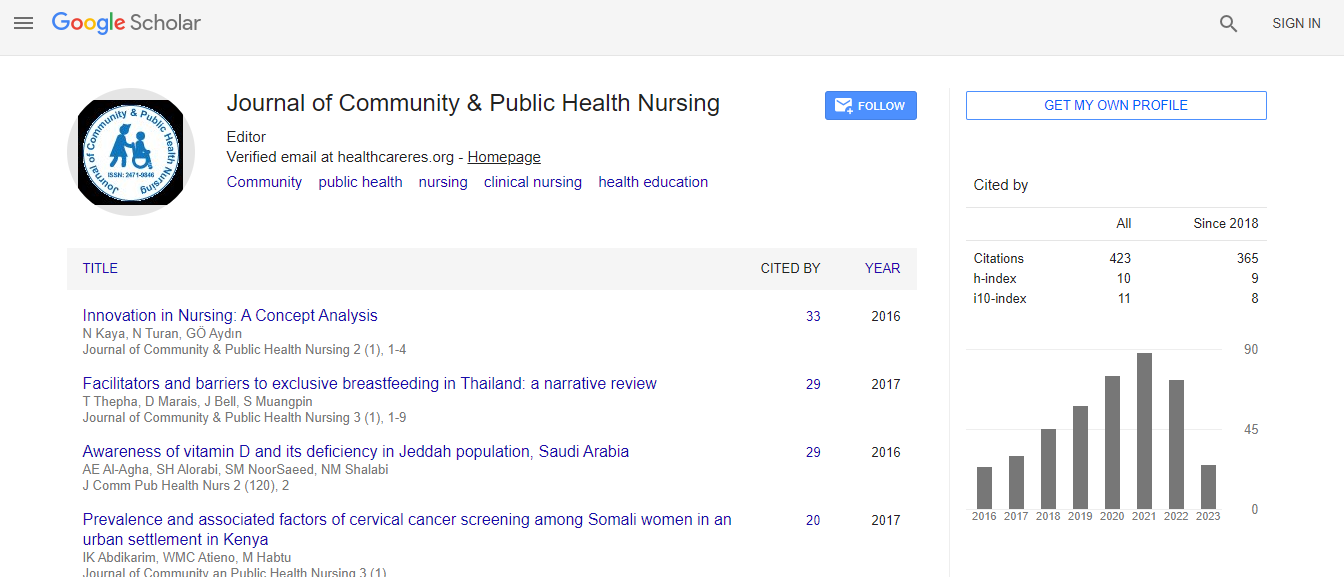Our Group organises 3000+ Global Conferenceseries Events every year across USA, Europe & Asia with support from 1000 more scientific Societies and Publishes 700+ Open Access Journals which contains over 50000 eminent personalities, reputed scientists as editorial board members.
Open Access Journals gaining more Readers and Citations
700 Journals and 15,000,000 Readers Each Journal is getting 25,000+ Readers
Google Scholar citation report
Citations : 739
Journal of Community & Public Health Nursing received 739 citations as per Google Scholar report
Journal of Community & Public Health Nursing peer review process verified at publons
Indexed In
- Google Scholar
- CiteFactor
- RefSeek
- Hamdard University
- EBSCO A-Z
- OCLC- WorldCat
- Publons
- Geneva Foundation for Medical Education and Research
- ICMJE
Useful Links
Recommended Journals
Related Subjects
Share This Page
A structural equation model of factors influencing the quality of life among incarcerated Filipino older adults
Joint Event on 21st World Congress on Registered Nurse and Nurse Practitioner Meeting & Nursing Education and Management
Jacinta Margaret Anne I Juta, Shardey F Labastida, Paola Diana V Lacas, Noreen Angela E Ladisla, Justine L Lagarteja and Les Paul M Valdez
University of Santo Tomas, Philippines
Posters & Accepted Abstracts: J Comm Pub Health Nursing
Abstract
Statement of the Problem: Among older adults, incarceration is challenging because of their complex health and social care needs (Maschi, Viola & Morgen, 2013); inadequate social support (Asberg & Renk, 2014); diminished contact with family and friends outside (Crossman, 2017); and social isolation (Kang & Ridgway, 1996; Matt & Dean, 1993). Hence, incarcerated older adults are likely to feel lonely, jeopardizing their mental well-being and increasing self-destruction (Khorshid, Eser, Zaybak, Yapucu, Arslan & Cinar, 2004) and depression (Arslantaş, Adana, Abacigil, Kayar & Acar, 2015). Thus, with these circumstances, the quality of life (QoL) of incarcerated older adults is greatly affected. Although QoL has been well studied among the general population, QoL among incarcerated older adults remains less explored. This study aims to examine the relationships between and among factors such as social engagement, depression, loneliness and social support and quality of life of incarcerated Filipino older adults. Methodology & Theoretical Orientation: Accordingly, this descriptive correlational study draws on the power of structural equation modeling (SEM) to analyze data from 315 purposively selected incarcerated Filipino older adults. Findings: The emerging model suggests that social engagement directly influences depression (β= -.267, p= <.01) and social support (β= .619, p=<.01). Social support, for its part, has a direct influence on loneliness (β= -.342, p=<.01) and quality of life (β= .217, p=<.01). Further, loneliness positively influences depression (β= .416, p=<.01). Lastly, the results also showed that decreased quality of life (β= -.292, p=<.01) is more likely to occur with incarcerated older adults who are depressed. Conclusion: This study highlights that social engagement, social support, loneliness, and depression predict the quality of life among incarcerated older adults. But despite being incarcerated, older adults can still achieve the quality of life by strengthening social support systems and social engagement as well as decreasing levels of loneliness and depression.Biography
E-mail: jacinejuta@gmail.com

 Spanish
Spanish  Chinese
Chinese  Russian
Russian  German
German  French
French  Japanese
Japanese  Portuguese
Portuguese  Hindi
Hindi 
